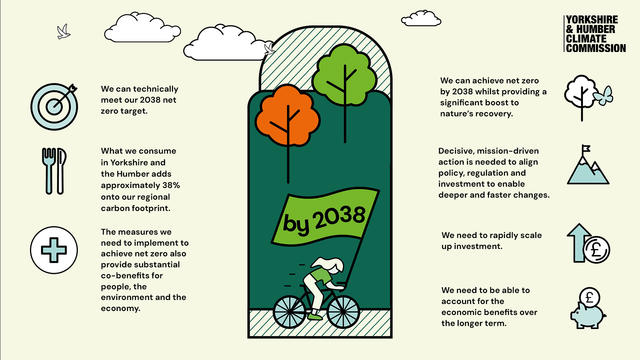Yorkshire and the Humber’s carbon story can be a positive one, says Commission
Thu, 07/25/2024 - 18:03

Yorkshire and the Humber can reach net zero in 15 years, generating billions in co-benefits for people, nature, and the economy – and we already have what we need to do it.
The region has an ambitious target to achieve net zero emissions by 2038, which can be achieved through ‘economically sound’ investments, more than a third of which pay for themselves.
As well as presenting clear and achievable pathways to net zero, a new report from Yorkshire & Humber Climate Commission reveals that consumption emissions add 38% to the regional carbon footprint. Emissions from transport and homes (especially the use of gas) account for almost half of these. Contributions from meat-eating, hobbies and pets, and aviation, among others, are also evaluated.
'Our Carbon Story’ reveals £7.3bn will be needed annually to 2038, and that a longer-term view of economic benefits needs to be taken to evaluate paybacks. The figure equates to just under 3% of regional GDP; by 2038 this will be compensated for by the value of the energy savings alone.
If Yorkshire and the Humber seizes the opportunity, by 2050 (the national net zero target) the region will already have created a conservative £250bn in co-benefits, particularly from health and wellbeing. Changes within the transport sector offer the biggest opportunity for unlocking these co-benefits through interventions that are low-cost, financially attractive, and straightforward.
Emissions overall have halved since 1990, meaning the region must go four times faster between now and 2038 to reach net zero.
Reducing Yorkshire and the Humber’s carbon emissions can also provide big wins for nature, if done well. Biodiversity can be boosted by improving farming practices, changing some land use away from animal agriculture to broadleaf woodlands, and from protecting and restoring wetlands and peatlands.
Regional mission needed
The report calls for a ‘mission-driven’ approach to rapidly reduce emissions, scale up investment and enable deeper and faster changes.
“Accelerating delivery to achieve the 2038 target increases the urgency of upfront investment in some measures – but it will also allow the co-benefits and savings to take effect sooner,” said Rosa Foster, director of the Yorkshire & Humber Climate Commission.
“It presents a perfect opportunity to unlock the potential of the region, so benefiting the UK economy as a whole.
“Our Carbon Story clearly demonstrates that it is both technically and economically feasible to achieve this regional net zero target. That strongly suggests that it is process, prioritisation, perspective, and governance that are the main barriers to realising our goal.
“The good news is that these are things within our gift to change. With the support of the Yorkshire & Humber Climate Commission, the region is ready and keen to work with the Government to deliver.
“If we do, our collective carbon story can still be a positive one.”
The report is underpinned by a carbon reduction assessment for Yorkshire and the Humber by independent academics, with research on consumption emissions by Dr Anne Owen of the University of Leeds.
Detailed sector briefings will be made available in the autumn, when the Commission will also be presenting the findings to MPs at Westminster for Parliamentary Evidence Week.
The report will be published on Yorkshire Day (1 August) and launched at the civic celebrations in York.
New norms
On 18 July 2024, a progress report to Parliament by the national Climate Change Committee pointed to costs of key low-carbon technologies falling, creating an opportunity for the UK to boost investment, reclaim global climate leadership, and enhance energy security, with British-based renewable energy being the cheapest and fastest way to do that.
The report highlighted the need to adapt to the physical risks of climate change as a prerequisite for delivering the path to net zero and said that action across all sectors of the economy was needed, with low-carbon technologies becoming the norm.
Meanwhile, the record for the hottest day in recorded history has been broken twice in one week, and the Met Office’s just-published State of the Climate report said that climate change is dramatically increasing the frequency of extreme high temperatures in the UK, representing dangerous upheaval for our ecosystems as well as our infrastructure.
Last year was the seventh wettest year on record, with weather extremes like heat and rainfall profoundly affecting communities and straining healthcare systems.





